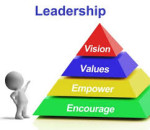 How does Larry Page (Google), Mark Zuckerberg (Facebook), Tim Cook (Apple) and Mark Parker (Nike) have continued success in their industries and are still loved by their employees? It’s not because they’re just intelligent and business-savvy, but they also have the soft skills that separate them from the pack. In other words, they’re great leaders through and through.
How does Larry Page (Google), Mark Zuckerberg (Facebook), Tim Cook (Apple) and Mark Parker (Nike) have continued success in their industries and are still loved by their employees? It’s not because they’re just intelligent and business-savvy, but they also have the soft skills that separate them from the pack. In other words, they’re great leaders through and through.
Simply being elected into a position of power doesn’t inherently mean a person is a good leader. Instead, these respected business titans and entrepreneurs built their empires by employing the key leadership skills necessary to succeed in any business setting.
You might have already bumped into business leaders you admire for possessing these magical leadership skills at some point in your career. They can be senior leaders who built a motivational office culture, or simply mid-level managers who inspired you to work smarter towards a common goal. All of these empowered business leaders shared some of the same leadership ingredients.
If you’re wondering what those leadership skills are, take a look at the list of leadership skills below. It’s rare that any one business leader wields all of these, but a true leader shares at least some (if not most) of these 10 important skills.
- Communication: It’s not sufficient enough to simply have several brilliant ideas swimming around in your head. If you’re a visionary, you’ll need to successfully communicate your ideas, action plan and expectations to achieve tangible results. A good communicator lets team members know his or her goals and priorities up-front, and trusts employees to tackle them.
- Confidence: For others to have confidence in you as a leader, you’ll need to exude confidence yourself. Good leaders avoid waffling and “stick to their guns” when it comes to decision-making. This portrays strength and conviction, and—combined with proven results—can prompt others to also trust in your vision.
- Honesty: Good leaders can outwardly admit their own strengths and weaknesses. Sharing both the good and the bad shows good character and builds trust from your employees. Armed with this knowledge, team members can provide support to fill in any gaps and avoid potential project pitfalls. Conversely, a lack of honesty can prevent goals from being met and cause an entire team to be negatively affected.
- Delegation: Many powerful leaders have “Type A” personalities, and can thus fall prey to seeking complete control of projects. A good leader avoids this type of micromanagement, and instead delegates responsibility to others. This frees leaders to focus on big picture items, empowers employees and allows rising stars to prove their worth. Successful leaders choose leaders that will promote the same principles, in business and morally.
- Relationship-Building: A savvy leader is able to network and build relationships both internally and outside of the workplace. This means nurturing positive relationships with key stakeholders, such as other managers, board members, clients and industry leaders. In turn, these different associations can often offer leverage and support when a leader encounters a problem or crisis.
- Influence: If you look back on all the memorable teachers, mentors and adults in your life, you’ll find that each have had a certain amount of influence on your life. Influence can be hard to describe tactically, but most agree that influence is the ability to inspire others. In some organizations, a leader’s influence can create culture shifts that allow exciting things (ideas, products, etc.) to come together. In other organizations, a leader’s influence can simply add value or provide clear direction to employees’ work.
- Intuition: Most great leaders have honed the art of intuition. Everyone has some level of intuition, but few have learned to accurately rely on that gut instinct. Unfortunately, many people have brushed off these feelings as paranoia, rather than taking the time to examine their true source. Influential leaders pair instinct with experience to make sound decisions and spot-on predictions.
- Adaptability: In today’s rapid-paced, technologically-laden world, the only thing certain is change. Good leaders are flexible enough to grow and change as an industry does (or ahead of competitors). Rather than let a company go stagnant, good leaders recognize improvements can be made to existing products or services, or a client base can be broadened with fresh ideas.
- Creativity: Much like adaptability, creativity is an important skill for a leader to master. Without creativity, a person in power can end up repeating the same routine. Therefore, a person may miss opportunities that fall outside of a usual process. Instead, good leaders allow some “play” time to stimulate unique ideas.
- Passion: Leaders must infect others with their own passion to effect change. Therefore, good leaders must possess a strong vision for their own future and the future of a company. This positive commitment to mission inspires employees and gives everyone a common goal to rally around.
Do you see leaders at your workplace using these skills? Have you found you’re lacking in any of these skills yourself? Honesty about your strengths and weaknesses may be the first step in becoming a more well-rounded business leader and mentor.
Like this article? Then help me share it on Linkedin, Facebook, Twitter, Google+ and by email
New to my site? then start here – How to Succeed like an Executive
Best wishes to your career success. See you at the top!
Lei
Great insight here on leadership, thanks for sharing